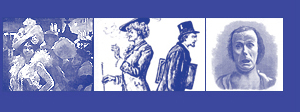Madness
Author : Andrew Wynter
Title : The Borderlands of Insanity (1875)
Keywords: asylums, physical, medicine, cured, eccentric, trained eye, management, revolution, mental disease, symptoms, speech, non-restraint, Pinel, Conolly.
Introduction
In the late-nineteenth century, the emerging city - particularly London - became an object of acute concern and interest to writers and social commentators seeking to make sense of a rapidly changing Britain. Initially, these writers relied upon obvious hierarchical divisions (East, West, rich, poor) to structure their investigations. Yet As Judith Walkowitz points out, these divisions overlooked the far more dangerous regions in which social boundaries collapsed. This shadowy world inspired confusion and fear as close proximity brought the risk of disease and contamination. An enlightening popular metaphor for understanding this idea was that of the ‘borderland,’ a shadowy region between regression and evolution, often impenetrable and constantly menacing society. The ‘borderland’ was widely adopted in literature and the popular press, soon becoming a metaphorical sphere that both unified and separated the increasing spatial consolidation of those city dwellers that were fearful of poor and criminal degenerates. Adapting this concept to make sense of the shadowy world of the insane (and importantly, partially insane), Andrew Wynter details the relationship between degeneration, insanity and heredity.
In these excerpts, taken from V. Skultans (ed.), Madness and Morals: Ideas on Insanity in the Nineteenth Century (London, 1975), Wynter reminds readers that the early signs of insanity – like other physical diseases – can be detected by a trained eye. Simultaneously, he defends the role of the specialist physician and promotes the physiological basis of insanity (and the chemical cure of the disease). In this respect, his views compliment those of Henry Maudsley, another key supporter of the centrality of evolution and heredity in mental disease and health. Unlike Maudsley, though, Wynter vigorously defends the site of the lunatic asylum and in doing so partially explains the demise of moral management. Its salvation, according to Wynter, lay in the importation of a new breed of asylum superintendants. ‘Fresh blood’ generated new ideas, and new attitudes could save the asylum from ruin. Once again, Wynter reinforces the powerful role of the physician in curing mental disease
Back to Madness Documents | Introduction | excerpt 1 | excerpt 2

